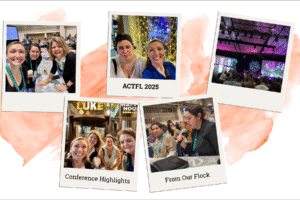
What Is Conversational Language Learning?
Learning a second language can be a difficult task. You need to work on your grammar, vocabulary, comprehension, and even do well in all areas required in language competency. After all, the goal of learning a new language is to be able to speak it with the natives, right? This is where conversational language skills come in. Here is a detailed look at everything you need to know about conversational language learning.

What Is Conversational Language?
Conversational language, also referred to as “everyday language,” “social communication,” or natural language, is used with peers, adults, and family members. Conversational language differs from technical language since it doesn’t use jargon and has the simplicity needed to ensure that listeners can easily understand what the speaker intends to say.
Conversational language learning helps people have a natural conversation and become fluent speakers. It goes beyond vocabulary and grammar rules to teach people how someone in that language actually talks in everyday situations.
Here are a few examples of what conversational language learning teaches:
- How to speak to different people. (Ex: your teacher vs. your friend)
- How to speak in different situations. (Ex: at school vs. at home)
- What subjects cause controversy. (Ex: politics, money, religion)
What Are the Benefits of Conversational Language?
Mastering conversational language is a skill, particularly when not a native speaker. Ideally, when you’re learning your first language, we start by speaking and then move to grammar and writing skills. However, with second language learning, the focus is on grammar and vocabulary rather than communicative competence.
That’s why businesses and individuals invest in practical language training and conversational practice. Here are four reasons why you need to learn an everyday language.
Integrates a Variety of Cognitive Skills
Conversational language learning helps learners assimilate acquired knowledge and integrate various cognitive skills to produce oral communication. This, in effect, means that you’re learning by doing.
This is different from comprehensive language learning, which focuses on vocabulary and grammatical structure – and that’s not enough to hold a natural conversation.
Provides a Pathway for Conversation
Conversation is a two-way street. Therefore, if you’re learning a new language, you must listen to comprehension exercises, and at the same time, listen to your trainer and converse with your fellow course participants. Therefore, learning a conversational language will improve your listening skills and help you build your second-language competency.
Builds Your Relationship
Building rapport is a crucial aspect of communication. It helps learners embrace curiosity, which helps in their learning curve. Learners cannot benefit from this unless they improve their conversation language. Additionally, learning conversational skills also helps understand other people, another great tool for second language learning.
Allows for the Use of Tailor-Made Content
Many forms of second-language learning take the form of grammatical perspective, which is not favorable for conversation building. However, if learners are encouraged to speak from the start of their second language learning, this would guarantee a different learning experience.
In that case, teachers can tailor-make their teaching experience according to individual or group needs or wishes. In the conversational learning approach, learners determine their content and how their teacher will engage them, making their experience more enjoyable.

How Can LanguageBird Improve Conversational Language Skills?
Learning and interacting with a native speaker is the best way to learn a new language. All of our instructors are native speakers of the target language and are accredited, education professionals. Our courses allow students to practice speaking their new language in a casual and informal way outside of the classroom.
Contact us today, and let us help you improve your conversational skills.




